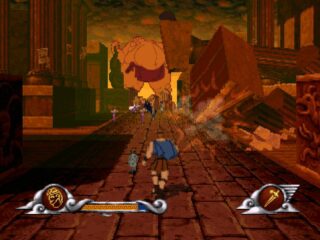The Simpsons: Bart vs the World is a 1991 platformer developed by Imagineering and published by Acclaim, originally for the NES. It followed the commercial success of Bart vs the Space Mutants and attempted to expand the formula by offering a globe-trotting adventure starring Bart Simpson. The story revolves around Bart winning a trip around the world in a Krusty the Clown art contest—rigged by Mr. Burns, of course—with each level taking place in a different international location.
On NES, the gameplay is a traditional side-scrolling platformer with occasional mini-games and simple puzzle elements. Bart explores locations like China, Egypt, and the North Pole, avoiding enemies, solving basic platforming challenges, and collecting items such as Krusty heads and trivia cards related to The Simpsons universe. The controls, however, are often criticized as clunky, with sluggish jumping and awkward collision detection making platforming frustrating rather than fun. Graphically, the NES version is colorful but suffers from repetitive backgrounds and choppy animations.
The Master System version is largely similar in design but features slightly sharper graphics and smoother scrolling, taking advantage of the hardware’s strengths over the NES. However, the differences are relatively minor and do not fundamentally change the gameplay experience.
More notable is the Amiga version, which benefits from better color depth, improved sprite detail, and richer backgrounds. While the core structure and level design remain the same, the improved audiovisual presentation makes the game more visually appealing. Even so, the gameplay flaws—particularly the unrefined controls and uneven level design—persist, limiting the experience regardless of platform.
Overall, Bart vs the World is a step up from its predecessor in terms of variety and scope, but it still fails to fully capture the humor and charm of The Simpsons. While fans of the franchise might find some enjoyment, especially in the trivia elements and cameos from the show, the game struggles to shine due to its frustrating controls. It remains a relic from a time when nearly every major pop culture property was quickly adapted into a video game.













